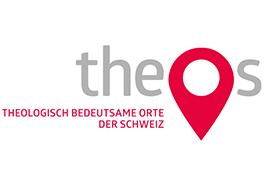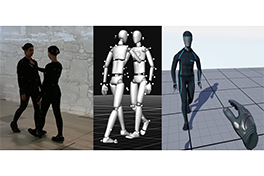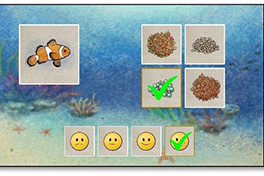Research projects
Through its Digitization Commission (DigiK), the University of Bern supports the following intra- or interfaculty research projects that contribute to its profile on the topic of "People in digital transformation, MidT".
Swiss Vettriage System, teletriage for animals

Vetsuisse
More Information as well as a translation will follow...
theos - Theologically meaningful places in Switzerland: Linking physical and digital places and its impact on people

Faculty of Theology
Digitalization is associated with a redefinition of the category of “space” because internet enables fast and free access to places that would be impossible or very difficult to reach in physical space. At the same time, digital places and spaces that can no longer primarily be experienced physically are emerging. To better understand these places and spaces and their impact on humans, the project applies a methodologically innovative combination of theoretical approaches from spatial theory with empirical findings. The model thus combines a concrete digitization project - the further development of the “theos” website and the linking of the digital(ised) places presented there with the physical spaces - with scientific reflection on the topic of “humans in digital transformation”.
Cybersecurity Standards in Complex Value Chains

Faculty of Law
More Information as well as a translation will follow...
You’ll never walk alone 2.0 – Outdoor Experience in the Age of Digitalization

Phil.-Hum.
The project “You’ll Never Walk Alone 2.0 – Outdoor Experience in the Age of Digitization” investigates how digital technologies transform outdoor movement activities like hiking and mountain running. As digital devices allow individuals to monitor their bodies and interact with virtual spaces, this interdisciplinary research explores how such technologies mediate experiences of embodiment and influence our connection to the natural environment. Through philosophical analysis and qualitative interviews, the project aims to understand both the enriching and alienating effects of technologies, such as self-tracking devices, on physical activities in outdoor settings.
Human Behavioral Control in Virtual Worlds

Phil.-Hum. Faculty
Virtual reality (VR) is becoming increasingly important as part of the digital transformation, opening up new learning opportunities in a wide range of applications. VR technologies are increasingly being used as a training tool, whether in clinical rehabilitation, competitive sports, or medical training, where complex emergency scenarios are practiced in a VR simulation. But does learning in VR lead to better performance in the real world? What factors contribute to the successful transfer of skills learned in VR to the real world? To fully exploit the potential of VR, a deep and problem-oriented understanding of the sensorimotor mechanisms that may limit transfer is of central importance. In the MidT-Profiling project "Human Behavioral Control in Virtual Worlds", we investigate influencing factors and barriers to the transfer of virtual experiences into the real world.
Digitalized feedback for children: Chances and limitations

Phil.-Hum.
Learning is crucial for human development, adaptability, academic performance, social interactions, and problem-solving. It often involves difficulties and failures, making the ability to recognize errors, ask for help, and re-study vital for success. Feedback is a powerful tool that enhances learning by aiding knowledge acquisition and metacognitive monitoring. Feedback is most effective when it includes information on both correctness and task processes. Children particularly benefit from feedback given by a social partner. Such feedback, however, is time-consuming and expensive regarding human resources and especially difficult to implement in classroom settings. Theoretically, the increasing digitalization can now enable the implementation of automatized, computer-based high-information feedback within digital learning environments to improve children's learning. Whether such digitalized feedback has the same effectiveness as in-person feedback from a social partner is widely unknown. Therefore, the present project aims to compare in-person feedback and individualized digital feedback regarding their effectiveness in supporting children's metacognitive processes and learning.
Prof. Dr. Claudia Roebers & Prof. Dr. Stefan Troche
More information will follow...
ERROR: Estimating the Reliability and Robustness of Research

Phil.-Hum. Faculty
ERROR is a comprehensive program to systematically detect and report errors in scientific publications, modelled after bug bounty programs in the technology industry. Investigators are paid for discovering errors in the scientific literature: The more severe the error, the larger the payout. In ERROR, we leverage, survey, document, and increase accessibility to error detection tools. Our goal is to foster a culture that is open to the possibility of error in science to embrace a new discourse norm of constructive criticism.
Algorithmic Management – Establishing Fair and Participative Shift Planning in Healthcare

Phil.-Nat. & WiSo Faculty
Shift plans determine when employees are working and thus have a significant impact on their satisfaction and their social life. Creating shift plans is a highly complex – often manually conducted – task because many legal and operational requirements must be respected. This sometimes leads to outcomes being perceived as unfair by employees, who nowadays have few options to reveal their preferences in this process. The project therefore seeks to develop fair AI-based algorithms and interfaces to put employees at the center of attention in time-shift planning in the healthcare context. (The link will be available soon)
Privacy in Digital Health Apps

Phil.-Hum. Faculty
The research project “PRIVATE” is developing approaches to improve privacy in the field of mental health applications. The aim is to increase transparency and control users have over the collection and processing of their personal data. Additionally, the clinical use of a completely anonymized app version is being evaluated.
Linked Data & Relational Databases: Grounded Knowledge

Phil.-Hist. Faculty
The project "Conveying, Connecting, and Preserving Grounded Knowledge" of the Faculty of Philosophy and History is a collaboration between four institutes: the Institute for Theater Studies (Swiss Theater and Dance Encyclopedia), the Institute for Musicology (Swiss Music Encyclopedia), the Institute for Archaeological Sciences (Digital Sumerian Lexicon), and the Historical Institute (Repetorium Academicum). Within the scope of this project, four databases originating from humanities research are being analyzed and modeled for subsequent availability to researchers and the general public.
Using digital sensing to predict human health and well-being – SENTI

Phil.-Hum. & Phil.-Nat. Faculty
Digitalization presents both opportunities and challenges for human health and well-being. While smartphone use has the potential to enhance psychological well-being and to support healthy behavior, problematic usage can have adverse effects on physical and mental health. In this context, mobile sensing technology, including smartphones, smartwatches, and wearables, offers a unique advantage by reaching individuals in their daily lives. It provides indicators for measuring and predicting psychosocial states and behaviors, encompassing affective states, mental health, social interactions, and health-related behaviors. The SENTI project is a collaboration of psychology and computer science aimed at leveraging mobile sensing technology to better understand and predict changes in health and well-being. Ultimately, its goal is to identify targets for just-in-time interventions to promote individuals' health and well-being in the long-term.
SeLeKt

Phil.-Hum. Faculty
In the "SeLeKt" project, we analyze how digital media promote self-regulated learning in high schools (Studybuddy) and sports science education (SwimMap). Using Learning Analytics, both tools optimize teaching and learning processes and enhance digital competence. Our research approach combines quantitative and qualitative methods to gain insights from both student and teacher perspectives.
Humans in Public Sector Digitalization

RW & WiSo Faculty
The research project examines the digital transformation process of public administration with a focus on digitized administrative procedures and its effects on the receiving end. The research aims to create a legal basis for the digital transformation in administrative procedures with the goal of increasing citizen benefits. Using an interdisciplinary approach through one dissertation each in Public Administration and Public Law, a survey collects data on the status of digitization in administrative procedures on the basis of related theories, and the stages of digitization in administrative procedures and their potential effects will be explored. Finally, based on the research findings we develop recommendations for the digital transformation of administrative procedures.
Linked Data & Relational Databases: Grounded Knowledge

Phil.-Nat. & RW Faculty
The project "Conveying, Connecting, and Preserving Grounded Knowledge" of the Faculty of Philosophy and History is a collaboration between four institutes: the Institute for Theater Studies (Swiss Theater and Dance Encyclopedia), the Institute for Musicology (Swiss Music Encyclopedia), the Institute for Archaeological Sciences (Digital Sumerian Lexicon), and the Historical Institute (Repetorium Academicum). Within the scope of this project, four databases originating from humanities research are being analyzed and modeled for subsequent availability to researchers and the general public.
Perception in Statistics, Econometrics and Probability

Phil.-Nat. & WiSo Faculty
Digitalisation enables faster and more efficient processes, however it also leads to an enormous increase of data to be analysed. For instance in medical studies, numerous quantities and features are reported for each person or procedure, hoping that this leads to additional insights, e.g. by means of artificial intelligence. One problem is that the human mind is able to grasp and imagine two- or three-dimensional objects. However, if the data consists of high-dimensional observations vectors, there exist surprosing effects which contradict human intuition. These effects render the detection of interesting structures rather difficult - a search for needles in a haystack. Another problem is that when analysing massive data, there is a danger of detecting apparent associations and other interesting effects which would rutn out to be spurious in future experiments or studies. In our project we shall work on both problems. A particular goal is a deeper understanding of when and how to apply certain methods of machine learning purposefully, instead of naive trial and error.
